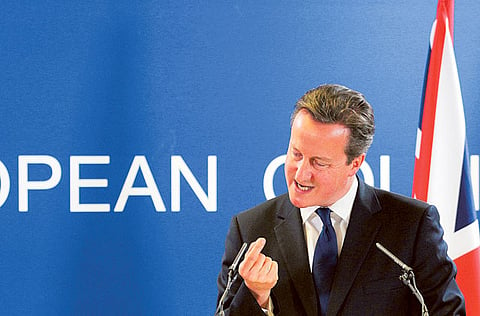UK faces stark choice over EU
Deepest divide between Britain and Europe in four decades

Dubai: Britain is at a crossroads when it comes to its future membership of the European Union following Friday’s tumultuous European Union leader’s summit in Brussels.
There, Prime Minister David Cameron was politically isolated in a 26-2 vote — only Hungary stood with the UK in opposing the nomination of Jean-Claude Juncker as European Commission president.
Since then, smarting from defeat, Cameron has publicly mused whether the UK has a place within Europe or should leave the economic and political trading bloc. Either way, it’s the deepest divide between Britain and the other members of the EU in the past four decades.
But Europe’s leaders are willing to mend fences, even if Cameron is determined to press ahead with a planned referendum on Europe if he wins the next general election, due in less than two years time.
The prime minister was told by the German chancellor, Angela Merkel, that she was “ready to address British concerns”, while Fredrik Reinfeldt, the Swedish prime minister, acknowledged that closer union was “not the best for everyone”. Both countries backed the nomination of Juncker, who is thought to favour further European integration.
Reinfeldt referred to a document issued by EU leaders after they voted 26-2 in favour of the arch-federalist’s nomination on Friday.
“Just look into what we have written in our conclusions,” he told BBC Radio 4’s Today programme. “You will find references with text, which I think is very important for David Cameron, saying this ever-closer union perception is maybe not the best for everyone.” This had “never been stated” by the EU before.
Reinfeldt said he was willing to “walk the extra mile” to address Cameron’s concerns over the EU.
Merkel, meanwhile, said she shared some of Cameron’s concerns and promised a review of how the president is nominated, a process that normally requires consensus among member states.
“I have every interest in having the UK continue to be a member of the EU,” she said. “The UK always has to take that decision itself but from a European perspective and a German perspective, I think this is most important and this is what I’m going to work on. We have shown very clearly that we are ready to address British concerns.”
The leader of Britain’s biggest business group has also waded into the dispute with a warning that the UK’s economic success depends on it remaining a full member of the EU.
The warning, from CBI director general John Cridland, came after David Cameron admitted on Friday that he now faced an uphill struggle to convince the British people to remain inside the EU.
Cridland told the Observer that full membership of the EU boosted British jobs, growth and investment. “The EU is our biggest export market and remains fundamental to our economic future,” he said. “Our membership supports jobs, drives growth and boosts our international competitiveness.”
He dismissed the idea that the UK economy could be just as successful outside the EU with some form of associate membership status, which some Conservatives advocate. “Alternatives to full membership of the EU simply wouldn’t work, leaving us beholden to its rules without being able to influence them. We will continue to press the case for the UK remaining in a reformed European Union.”
Cameron, who will make a statement to the House of Commons on the summit on Monday, said Juncker’s appointment and Europe’s refusal to change had made his task of renegotiating the UK’s terms of membership before the referendum much harder.
Labour leader Ed Miliband also highlighted the economic danger of an exit from the EU, saying Cameron was putting future success at risk. “David Cameron and the Conservative party now pose a clear and present danger to our economy,” he said. “The choice is between Labour, which would win the argument and build alliances for reform, or David Cameron, who by his own admission is taking the country towards the EU exit door, threatening three million jobs across the UK.
The Ukip leader, Nigel Farage, however, said the prime minister had no support from European leaders and that Cameron’s defeat exposed his inability to renegotiate Britain’s relationship with Brussels.
Farage said there was a mood within the EU that it would rather get rid of the “friendless” UK than allow it to start “picking apart treaties”. He told Today that leaders viewed Britain as “a damned nuisance” that was always complaining.
He added that while Merkel said she would address British concerns, ultimately, when she “puts her foot down” everybody fell into line.
“She said countries can move at different paces, while some can get there more quickly than others, but she wasn’t for a moment suggesting that Britain can opt out of the principle of an ever-closer union... What I saw yesterday was the prime minister utterly humiliated, looking like a loser who had learnt nothing, still insisting, though it’s rather more difficult, that he can renegotiate our position. He can’t.
“In terms of the fundamental changes that the British people really want in this relationship, namely, we want a trade deal and not membership of a political union, I would say this to you: the other European leaders and certainly the European parliament would rather the United Kingdom left the EU than start to pick apart the treaties because if they do that they know there’ll be half a dozen other northern European countries that will demand the same.”
— Compiled from agencies



